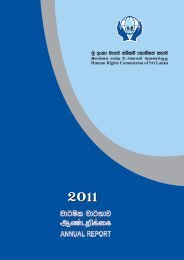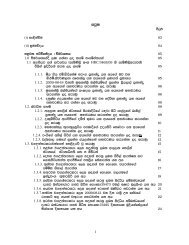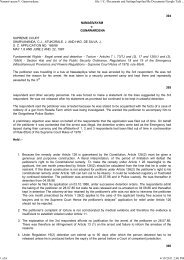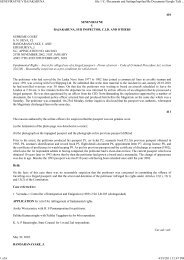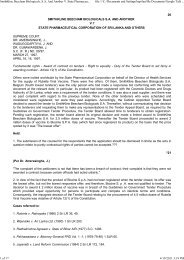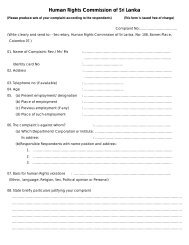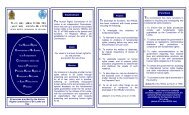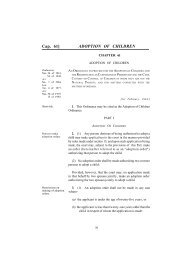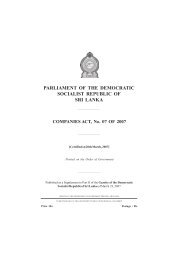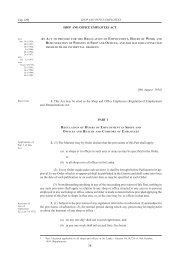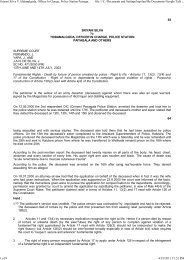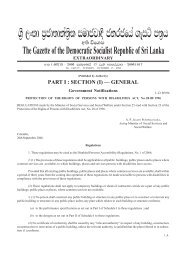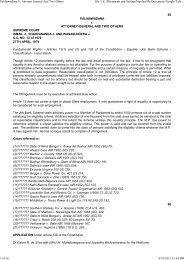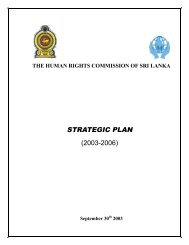Gamini Dissanayake (Petitio... - Human Rights Commission of Sri ...
Gamini Dissanayake (Petitio... - Human Rights Commission of Sri ...
Gamini Dissanayake (Petitio... - Human Rights Commission of Sri ...
You also want an ePaper? Increase the reach of your titles
YUMPU automatically turns print PDFs into web optimized ePapers that Google loves.
<strong>Gamini</strong> <strong>Dissanayake</strong> (<strong>Petitio</strong>ner In Sc 4/91) V. Kaleel, M.C.M. And Others file:///C:/Documents and Settings/kapilan/My Documents/Google Talk ...<br />
against the Executive Presidential System. According to the respondents, the said events coupled with the<br />
petitioners' conduct in failing to first raise the issues within the Party organizations represent a repudiation <strong>of</strong> the UNP<br />
Constitution and a flagrant breach <strong>of</strong> party displine and a cover for insulting the character, integrity and ability <strong>of</strong> the<br />
Leader <strong>of</strong> the Party in his capacity as President <strong>of</strong> the country which eventually brought the Party and its Leadership<br />
to disrepute and held it up to public ridicule.<br />
The petitioners take up the position that in respect <strong>of</strong> both events referred to above their acts are protected<br />
by Article 4 (a) and (e) read with Article 93, 10, 14 (1) (a) and 38 <strong>of</strong> the Constitution and Section 3 <strong>of</strong> the Parliament<br />
(Powers and Privileges) Act (Cap. 383) that the grounds <strong>of</strong> expulsion derogate sovereignty, their freedom <strong>of</strong> thought,<br />
conscience, speech and expression and their privileges as Members <strong>of</strong> Parliament assured by the aforesaid<br />
constitutional and statutory provisions. They deny having repudiated the Party Constitution and state that in any event<br />
the provisions <strong>of</strong> the Party Constitution in particular Rules 7(3), 9(4) and 17(2) there<strong>of</strong> relied upon for the expulsion<br />
cannot override such protections, freedoms and privileges and accordingly the order <strong>of</strong> expulsion is invalid. As<br />
regards the allegation that they failed to first raise the issues within the Party organizations, they state that there did<br />
not exist a measure <strong>of</strong> freedom to raise matters which would involve a curtailment <strong>of</strong> Presidential powers.<br />
Mr. de Silva, P.C. concedes the right to take disciplinary action but submits that expulsion (which has the<br />
consequence <strong>of</strong> loss <strong>of</strong> Membership <strong>of</strong> Parliament) cannot be effected on grounds which are contrary to the<br />
Constitution which is the paramount law ; contractual obligations are secondary norms. 'General Theory <strong>of</strong> Law and<br />
State' Kelsen (1961) 124, 137. Learned Counsel vehemently contended that the grounds <strong>of</strong> expulsion are based on<br />
alleged breaches <strong>of</strong> the provisions <strong>of</strong> the UNP Constitution which strike at the very root <strong>of</strong> the fundamental postulates<br />
<strong>of</strong> the Constitution. He was particularly critical <strong>of</strong> Rule 7(3) (obligation <strong>of</strong> government M.P. s to take directions from<br />
the Party Leader or the Leader <strong>of</strong> the Parliamentary Party as to the conduct <strong>of</strong> matters in Parliament) ; Rule 9(g)<br />
(obligation <strong>of</strong> M.P.s to conform to the principles, policy, programme, rules and code <strong>of</strong> conduct and standing orders<br />
<strong>of</strong> the Party) and Rule 17(2) (obligation <strong>of</strong> M.P.s to vote in Parliament according to the Mandate <strong>of</strong> the Parliamentary<br />
Party conveyed through the Whip <strong>of</strong> the Party).<br />
Dealing with the ground <strong>of</strong> expulsion based on the petitioners' conduct in signing the notice <strong>of</strong> resolution,<br />
learned Counsel referred us to 'Theory and Practice <strong>of</strong> Modern Government' Finer (1946) Vol. l 633-652 and<br />
submitted that the 'free mandate' theory discussed therein and which is enshrined in some continental Constitutions is<br />
implicit in our Constitution (Articles 4(a), (e) and 93) ; that accordingly a member is not bound by instructions ; and he<br />
cannot be penalised for anything done in Parliament. Signing the notice <strong>of</strong> resolution was not a breach <strong>of</strong> the UNP<br />
Constitution ; on the contrary it was their duty to the nation under the Constitution <strong>of</strong> the Republic to give such notice<br />
(Article 38). Such notice is a "proceeding" in Parliament which cannot be impeached outside the House for want <strong>of</strong><br />
prior permission for it. The conduct <strong>of</strong> the petitioners in having signed it is similary protected by the provisions <strong>of</strong><br />
Section 3 Parliament (Powers and Privileges) Act ; see also, Parliamentary Practice - Erskine May 19th Ed. 87.<br />
Counsel conceded that if the sole motive for signing the resolution was to humiliate the Leader <strong>of</strong> the Party and mala<br />
fide, disciplinary action is competent ; but there ought be evidence <strong>of</strong> such motive. He also submitted that if the<br />
emphasis in the charge against them is signing the resolution with some members <strong>of</strong> the opposition, Article 38 is a<br />
complete answer.<br />
As regards the campaign against the Executive Presidential System, Counsel submitted that the Party is not<br />
irrevocably committed to continue that system ; that in any event the petitioners were not seeking to abolish but to<br />
reform it by remedying anomalies ; that any peaceful advocacy <strong>of</strong> change is 'a legitimate exercise <strong>of</strong> the freedoms<br />
guaranteed by Articles 10 and 14(1)(a) <strong>of</strong> the Constitution ; that even if it were a matter <strong>of</strong> Party Policy, the party<br />
cannot exercise an unqualified right <strong>of</strong> expulsion for contravening such policy but should consider disciplinary action<br />
short <strong>of</strong> expulsion ; that expulsion would be warranted only in the case <strong>of</strong> serious conduct such as bribery or<br />
<strong>of</strong>fences involving moral turpitude ; and that the campaign intended to reform the party is permitted by the objects <strong>of</strong><br />
the party contained in Rule 4(c) <strong>of</strong> its Constitution namely, the promotion <strong>of</strong> the political education <strong>of</strong> the people and<br />
their political emancipation on the basis <strong>of</strong> Democratic Socialism. It was also submitted that the allegation that the<br />
petitioners should have first raised these matters within the party assumes that there is a measure <strong>of</strong> freedom within<br />
the party to raise such matters. Counsel argued that the UNP Constitution<br />
imposes a centralised system which negatives freedom ; and this is aggravated by the provisions which<br />
enables the Leader to enjoy full power ; that matters had reached a stage when no discussion was possible and the<br />
action taken by the petitioners was logical and within their rights ; and that actions for reforming the party are also<br />
legitimate even if the party were to thereby suffer disintergration. These rights, it was submitted, cannot be<br />
comprehended under party discipline.<br />
43 <strong>of</strong> 56 4/20/2011 1:18 PM<br />
220<br />
221



